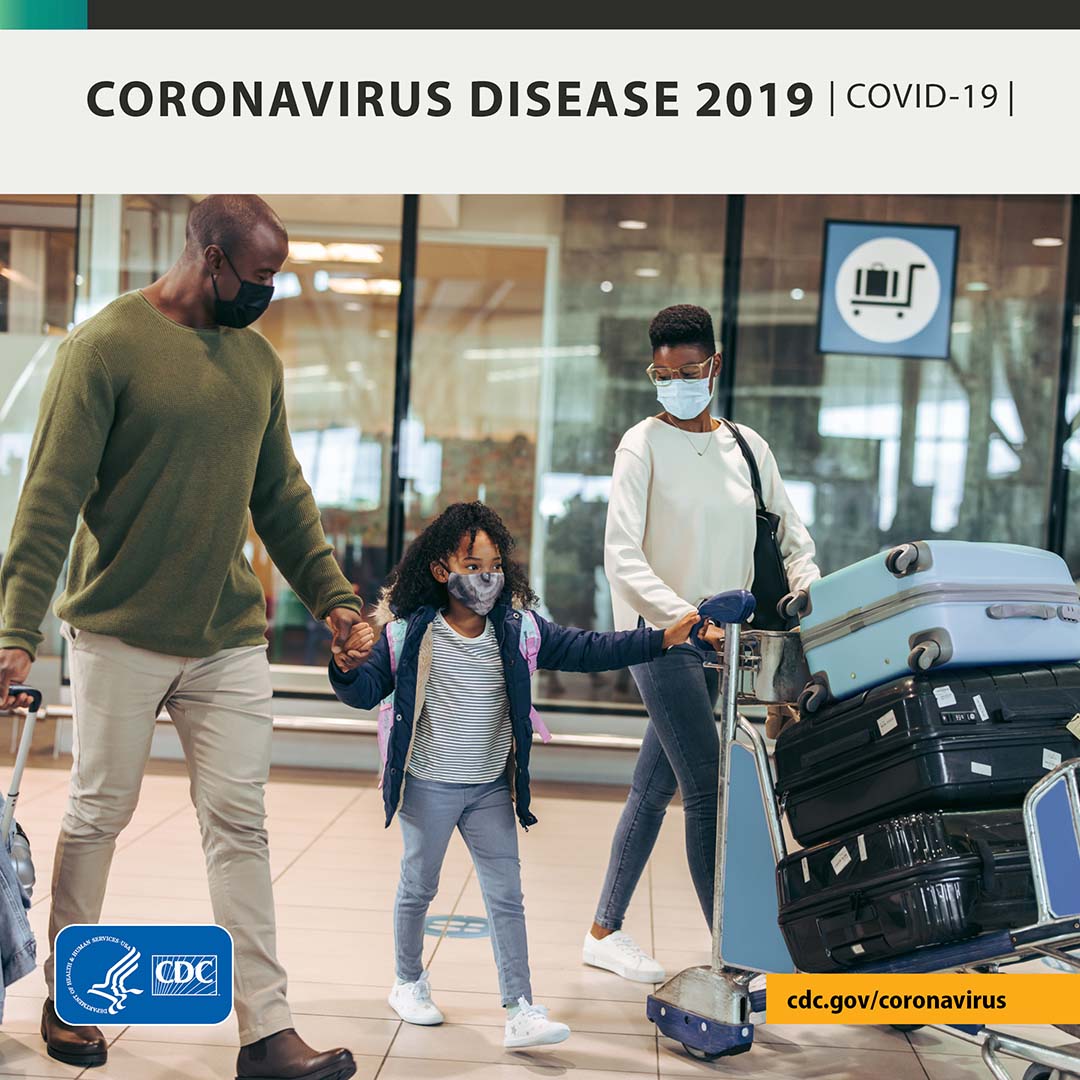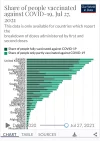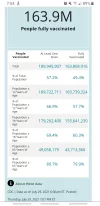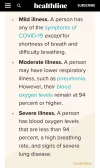Bob K (Phoenix)
New Member
- Time of past OR future Camino
- Frances 2023
| Remove ads on the forum by becoming a donating member. More here. |
|---|
That’s excellent advice. I have not yet bought any travel insurance but have pretty much decided on GeoBlue (Blue Cross Blue Shield). A phone call confirmed to me that coverage is not affected by CDC warnings.But I do suggest you look at your travel and health insurance.

***SO important!! In the US many insurance plans will NOT pay for ANYTHING if you travel to a red zone. My regular travel insurance is also not able to be used. I was to leave in two weeks and didn’t even think about how the raised level to red would make all my insurance useless. Please look at your plans before you travel. While I am still ok with traveling during delta (with masksMembers, this forum is not the place to debate the advice from the CDC.
The link has been shared by @Bobthebome for information purposes. Members make their own decisions about whether to follow it. But I do suggest you look at your travel and health insurance.
You may be right, but it is more helpful to give the names of specific companies that have that policy. Can you tell us which companies you are referring to? GeoBlue (which is Blue Cross Blue Shield, so certainly very reputable) told me that the CDC warnings have no impact on medical coverage abroad.**SO important!! In the US many insurance plans will NOT pay for ANYTHING if you travel to a red zone. My regular travel insurance is also not able to be used.
A similar advisory was issued by the CDC late yesterday regarding all travel to Portugal.From the CDC: Spain Travel Advisory: Level 4: Do not travel, July 26, 2021.
See https://wwwnc.cdc.gov/travel/notices/covid-4/coronavirus-spain
I don't want to derail this thread but you misunderstood the comment. It had nothing to do with Covid-19. It was a small amount (only €100). The person in question found it too much hassle and didn't go to the bank. I doubt that a certified check was required. More likely just proof of a bank transfer. It's an administrative issue related to how public health clinics are set up in Spain, and all this doesn't even apply to all of them.I read on one of the other posts that Americans have to go to a bank and present certified funds, aka a certified check, to the hospital before treatment. They do not accept cash or credit cards from people outside the EU. Has anyone heard of this happening?
All good ideas. Also be sure your health insurance will cover you in Europe and if not get supplemental and be sure you can cover the cost of 2 wk quarantine if a worst case should happen: a positive predeparture test. Tests before flight are required of everyone, even fully vaccinatedIt actually says:
That said, when I booked my flight I made sure to buy tickets I could change and I bought travel insurance in case a ban would be announced. For me a ban would be an inconvenience. I am praying for those who are getting Covid.
- Avoid travel to Spain.
- If you must travel to Spain, make sure you are fully vaccinated before travel.
It’s not based on vaccination rates it’s based on cases, especially of delta since that is less likely to be stopped by the vaccine. It’s as much about making sure you don’t bring something home with you as keeping you safe. That said, there are places I wouldn’t travel to in the US if I didn’t need to right now either.There are lots of states in the US that are as risky Covid-wise or worse. Plus the rate of vaccination is higher in Spain than the US!
My husband was hurt, broken shoulder, had to go to hospital in Santiago. They did not except insurance, we provided Visa and he was treated. Great service! Even provided interpreter! Upon returning back to US we contacted the Allianz insurance and all was re-imbursed. Waiting till next year to walk another Camino. Will be 80 and sadly my last Camino?***SO important!! In the US many insurance plans will NOT pay for ANYTHING if you travel to a red zone. My regular travel insurance is also not able to be used. I was to leave in two weeks and didn’t even think about how the raised level to red would make all my insurance useless. Please look at your plans before you travel. While I am still ok with traveling during delta (with masksI can’t afford to hurt myself in Spain. I read on one of the other posts that Americans have to go to a bank and present certified funds, aka a certified check, to the hospital before treatment. They do not accept cash or credit cards from people outside the EU. Has anyone heard of this happening? I am pushing this 3rd Camino back to mid-late September in hopes of things improving and insurance coverage. If not May will be a beautiful time to walk.
Be well pilgrims, stay safe and keep adventuring!
That is something I have been wondering about. The CDC regulations themselves only require a negative test for return to the US. They say nothing about what happens to you if you test positive. I suppose they could require proof of a quarantine for whatever duration, but I have not seen anything that deals with what the hapless peregrino will do if there is a positive result.be sure you can cover the cost of 2 wk quarantine if a worst case should happen: a positive predeparture test.
Good points I’ll try to research but I’d be very surprised if Spain public health didn’t require some sort of quarantine. At any rate you wouldn’t be getting on airplane home and it would be supremely selfish bordering on sociopathic to just travel around Spain for 10-12 daysThat is something I have been wondering about. The CDC regulations themselves only require a negative test for return to the US. They say nothing about what happens to you if you test positive. I suppose they could require proof of a quarantine for whatever duration, but I have not seen anything that deals with what the hapless peregrino will do if there is a positive result.
Nor does the US Embassy site provide any guidance (at least none that I have seen) about what to do if you get covid in Spain.
Spain has no quarantine requirements for those who test positive as far as I know.
I am sure there are factual answers to these questions, but I have not been able to find them.
Totally agree. I certainly wasn’t suggesting that I think it’d be a good idea to do anything like that. I was wondering more about whether someone who tests positive one day and negative the next would be able to go home. I assume that in every covid illness, there is one day when you test positive and the next day the disease is gone, so I was just curious about how that would work overseas in a regime that seems to only require a negative test.Good points I’ll try to research but I’d be very surprised if Spain public health didn’t require some sort of quarantine. At any rate you wouldn’t be getting on airplane home and it would be supremely selfish bordering on sociopathic to just travel around Spain for 10-12 days
Still struggling with Spanish on their province public health pages but this bbc article alludes to UK covid pos patient being required to isolate in Spain. What happened with the pilgrims that were positive on another thread (I didn’t read)That is something I have been wondering about. The CDC regulations themselves only require a negative test for return to the US. They say nothing about what happens to you if you test positive. I suppose they could require proof of a quarantine for whatever duration, but I have not seen anything that deals with what the hapless peregrino will do if there is a positive result.
Nor does the US Embassy site provide any guidance (at least none that I have seen) about what to do if you get covid in Spain.
Spain has no quarantine requirements for those who test positive as far as I know.
I am sure there are factual answers to these questions, but I have not been able to find them.

I’m thinking once positive you’re going to be stuck with a positive diagnosis if for no other reason erring on side of caution. But since it’s just the airline looking at a piece of paper I imagine some have slipped by by repeating test or faking results. This whole system relies a great deal on a bit of altruism.Totally agree. I certainly wasn’t suggesting that I think it’d be a good idea to do anything like that. I was wondering more about whether someone who tests positive one day and negative the next would be able to go home. I assume that in every covid illness, there is one day when you test positive and the next day the disease is gone, so I was just curious about how that would work overseas in a regime that seems to only require a negative test.
What do you mean, “stuck with a positive diagnosis?” I don’t mean to nitpick, but I don’t understand how people are expected to transition to a negative diagnosis without a test. I’m not talking about people trying to fake results, I’m wondering about people who are trying to do the right thing.I’m thinking once positive you’re going to be stuck with a positive diagnosis if for no other reason erring on side of caution. But since it’s just the airline looking at a piece of paper I imagine some have slipped by by repeating test or faking results. This whole system relies a great deal on a bit of altruism.
This info from UK says stay isolated in hotel until authorities contact you (could take up to 72 hours) then do as told by them https://www.gov.uk/foreign-travel-advice/spain/coronavirusThat is something I have been wondering about. The CDC regulations themselves only require a negative test for return to the US. They say nothing about what happens to you if you test positive. I suppose they could require proof of a quarantine for whatever duration, but I have not seen anything that deals with what the hapless peregrino will do if there is a positive result.
Nor does the US Embassy site provide any guidance (at least none that I have seen) about what to do if you get covid in Spain.
Spain has no quarantine requirements for those who test positive as far as I know.
I am sure there are factual answers to these questions, but I have not been able to find them.

Not nit picking. I agree someone may be positive at the end of their illness and negative a few days later. But I think they will already be in quarantine then and unlikely to be allowed to be tested. But I’m not a Spanish public health dr.What do you mean, “stuck with a positive diagnosis?” I don’t mean to nitpick, but I don’t understand how people are expected to transition to a negative diagnosis without a test. I’m not talking about people trying to fake results, I’m wondering about people who are trying to do the right thing.
Especially with the potential for asymptomic breakthrough cases for vaccinated people, I would think it’s not at all ridiculous to suppse that they get a test that shows they have covid, which they actually have had for weeks, Then a day or two later, they test negative. Should these people not go back to the US? I know it’s impossible to imagine all the many possible scenarios, but I was hoping to see what the rules were so pilgrims will know what risks they are taking if they go to Spain.
For Info only: As of July 28, the Government of Canada has not changed its travel advisory and Covid warnings for Spain. Canada still discourages foreign travel for nonessential reasons and advises strong Covid safety measures for Spain.From the CDC: Spain Travel Advisory: Level 4: Do not travel, July 26, 2021.
See https://wwwnc.cdc.gov/travel/notices/covid-4/coronavirus-spain
No thats not true, the US is at approximately 66% currently.There are lots of states in the US that are as risky Covid-wise or worse. Plus the rate of vaccination is higher in Spain than the US!
No thats not true, the US is at approximately 66% currently.



What is your source for this statement, which seems very different from every report I've seen.the US is at approximately 66% currently.
It was 49,8 % 2 days ago.No thats not true, the US is at approximately 66% currently.
Just to clarify...Today, July 29,2021 its about 49% fully vaccinated and 58% partially vaccinated. In the US. per the federal government :

COVID Data Tracker
CDC’s home for COVID-19 data. Visualizations, graphs, and data in one easy-to-use website.covid.cdc.gov
Probably @Eric G saw some state figures accidentally.

Apparently what the lay public considers to be a mild case is quite different than what the medical establishment considers to be mild. You can feel very ill for a week or so with "mild" Covid!If you travel in the next couple months you are quite brave. I'm not talking about covid either because the vaccines seem to make cases asymptomatic or mild. I mean popping positive and spending x amount of days in a hotel room. Yikes.


It is possible to have a false positive with an antigen test. So, if I had a positive antigen test, I would then get a Rapid PCR ….ASAP. If that too came back positive,I would quarantine, but ask to get another PCR (I am paying, after all) after 5 days.What do you mean, “stuck with a positive diagnosis?” I don’t mean to nitpick, but I don’t understand how people are expected to transition to a negative diagnosis without a test. I’m not talking about people trying to fake results, I’m wondering about people who are trying to do the right thing.
Especially with the potential for asymptomic breakthrough cases for vaccinated people, I would think it’s not at all ridiculous to suppse that they get a test that shows they have covid, which they actually have had for weeks, Then a day or two later, they test negative. Should these people not go back to the US? I know it’s impossible to imagine all the many possible scenarios, but I was hoping to see what the rules were so pilgrims will know what risks they are taking if they go to Spain.
I'm sure there is every degree possible since millions and millions of people have had it. I have tons of opinions on this stuff that don't belong here thoughApparently what the lay public considers to be a mild case is quite different than what the medical establishment considers to be mild. You can feel very ill for a week or so with "mild" Covid!
View attachment 105841

Mild COVID-19 Symptoms: Timeline, Progression, Contagiousness
COVID-19 severity is often divided into categories like mild, moderate, and severe. But what does a mild case of COVID-19 typically entail?www.healthline.com
I agree!Either way, my point was getting stuck and if you did happen to get really sick as well, bad situation. Not worth the risk for me.
Thank youI don't have anything to add to CDC info or travel insurance issues since I'm not in the US. We are American expats living in Luxembourg for 10+ years. We are currently on camino these past few weeks from Pamplona and currently in Trabadelo. We were fully vaccinated in Luxembourg before travelling. We found travel here well monitored for any signs of illness as well as checking for testing results and vaccination paperwork (EU Covid Passport). The CF path has been quite sparse with pilgrims and the hosts/proprietors have done all they can to make things as safe and clean as they know how. It is heartbreaking to see so many businesses closed and the few that are open struggling so hard! We've had entire hostels, pensions and even restaurants to ourselves. My impression is that we are about as "safe" here as any other place due to the fact that everyone is trying so hard. We, of course, use hand sanitiser and hand washing as often as available, wear masks when indoors except for eating and do our best to social distance. I realise everyone must determine for themselves the level of risk they are willing to accept but please consider, what are your risks in your current environment or home town... I understand the CDC evaluates numbers and stats but are these specifically related to the whole of Spain or are they regional like major cities (I don't know the answer to this)? We are out in very rural areas with limited numbers of people to encounter while on camino and even in the larger cities we've managed to avoid crowds. Please don't beat me up, I'm just trying to share some perspective and to help avoid fear mongering. My best to all preparing for their upcoming caminos, I hope this is helpful.
I love all of this information, ty! I was wondering what it would be like on the Camino. I just canceled my plans for going Mid August. I am taking a friend and I want her to have the full experience with meeting pilgrims from all over the world. We are considering rebooking for late Sept. We are both vaxxed and (although not for certain!) Spain is projected to peak during Aug. Hopefully that means a safer, aka less worrisome, Camino is a possibility. If Spain is still in the red or even amber (by the US guidelines) I will just take her next year. I’m so happy to hear that you feel “safe” thereThank you
I'm going August 12 from NJ to Barcelona. I liked what you said about we are no safer here than in Spain. I am vaccinated, I will wear a mask and keep as distant as possible;e. I don't want to wait another year to do the Camino.I don't have anything to add to CDC info or travel insurance issues since I'm not in the US. We are American expats living in Luxembourg for 10+ years. We are currently on camino these past few weeks from Pamplona and currently in Trabadelo. We were fully vaccinated in Luxembourg before travelling. We found travel here well monitored for any signs of illness as well as checking for testing results and vaccination paperwork (EU Covid Passport). The CF path has been quite sparse with pilgrims and the hosts/proprietors have done all they can to make things as safe and clean as they know how. It is heartbreaking to see so many businesses closed and the few that are open struggling so hard! We've had entire hostels, pensions and even restaurants to ourselves. My impression is that we are about as "safe" here as any other place due to the fact that everyone is trying so hard. We, of course, use hand sanitiser and hand washing as often as available, wear masks when indoors except for eating and do our best to social distance. I realise everyone must determine for themselves the level of risk they are willing to accept but please consider, what are your risks in your current environment or home town... I understand the CDC evaluates numbers and stats but are these specifically related to the whole of Spain or are they regional like major cities (I don't know the answer to this)? We are out in very rural areas with limited numbers of people to encounter while on camino and even in the larger cities we've managed to avoid crowds. Please don't beat me up, I'm just trying to share some perspective and to help avoid fear mongering. My best to all preparing for their upcoming caminos, I hope this is helpful.
What is your source for this statement, which seems very different from every report I've seen.
https://covid.cdc.gov/covid-data-tracker/index.html#vaccinations as of this morning.Just to clarify...
That percentage includes children under 12, who are not yet eligible for vaccinations. As of today, July 29, the percentage of fully vaccinated, age 12 and over is 57.7, age 18 and over 60.3, and 65 and over 78.9.
Of course none of this has any bearing on getting to Spain from the US, since vaccination is not required. But hey, when has a forum thread ever stay totally on topic?View attachment 105840
Agreed! 57.9% of those eligible fully vaccinated, 67.1% with at least one dose.Since no one under the age of 12 is eligible to take the vaccine the second set seems more reflective of the willingness of people to vaccinate than including people who cannot be vaccinated.
True, but I think we were discussing vaccination as a way to reduce transmission. Willingness is another topic altogether, and not a good one for the forum.the second set seems more reflective of the willingness of people to vaccinate
I just checked our West Virginia state statistics and they also reflect those from the CDC- over the age of 12 the rates are 56 and 68% as well. I would think then those who have received one dose will get the second dose thereby increasing the percentage of those fully vaccinated. I am assuming the category of "at least one dose", only includes those vaccines that require two doses and those who received a vaccine that requires only one dose (J & J here in the US) are included in the fully vaccinated category.Agreed! 57.9% of those eligible fully vaccinated, 67.1% with at least one dose.
I think "willingness" of a population to vaccinate as reflected in some rates is important to reducing transmission in that population. I was not at all referring to individuals who will/will not vaccinate.True, but I think we were discussing vaccination as a way to reduce transmission. Willingness is another topic altogether, and not a good one for the forum.
@Eric G was saying that the US rate was higher than Spain, which inot true.
Today, July 29,2021 its about 49% fully vaccinated and 58% partially vaccinated. In the US. per the federal government :

COVID Data Tracker
CDC’s home for COVID-19 data. Visualizations, graphs, and data in one easy-to-use website.covid.cdc.gov
Probably @Eric G saw some state figures accidentally.


